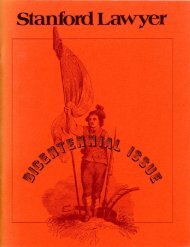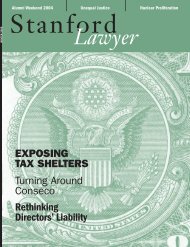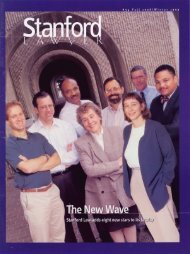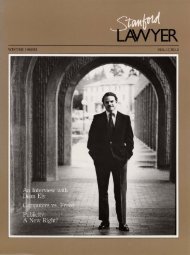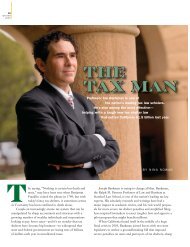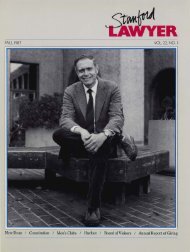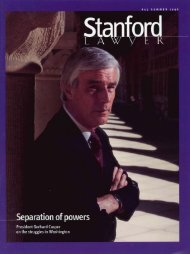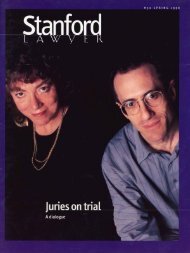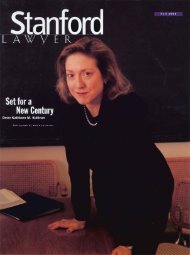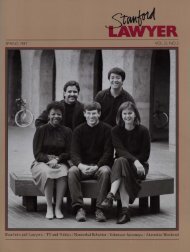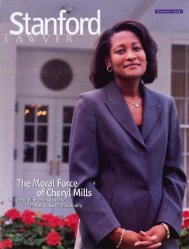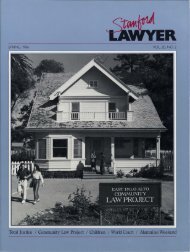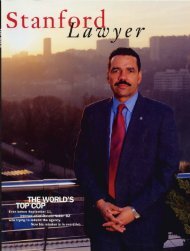Summer 2003 – Issue 66 - Stanford Lawyer - Stanford University
Summer 2003 – Issue 66 - Stanford Lawyer - Stanford University
Summer 2003 – Issue 66 - Stanford Lawyer - Stanford University
- No tags were found...
You also want an ePaper? Increase the reach of your titles
YUMPU automatically turns print PDFs into web optimized ePapers that Google loves.
30 GRADUATIO" T <strong>2003</strong>SUMMER<strong>2003</strong>time, remarked that in the 20 months since the 9/11 tragedies, some ofhis worst fears have come true. "We have passed through an era in whichlaw and lawyers have withdrawn to the sidelines, and our military andsecurity institutions have taken center field," he said. "This has been anera of war, and in times of war, as Cicero said, the laws fall silent."Fisher's pointing to the many ways that the law has been changed orevaded in the quest for security was not meant "to indict our leaders,"but rather "to lament our loss," he explained. "We have learned thatwhen our very survival is at stake, the legal terms of that survival maybecome negotiable."Yet Fisher cautioned against too much pessimism. Even as the law'sinfluence waned in some areas, it waxed in others. He cited the successfulchallenges to racial profiling, discriminatory lending practices,executions of the mentally retarded, corporate fraud, and new securitymeasures put in place since September 11 as evidence that the rule oflaw remains vibrant. He expressed, in particular, the hope that theSupreme Court would repudiate its 1986 ruling in Bowers v. Han/wick,which essentially allowed states to outlaw homosexual sex. (His hopecame true a few weeks later when, on June 26, t11e Court reversed itselfin LaW1"e77Ce v. Texas.)"The rule of law cannot cure all the world's evils," Fisher said. "Butit can cure some."And he concluded: "When you leave here today, I hope you will goout there resolved to cure t1lOse evils that are within the law's power tocure. We will be here, waiting while the world decides whether the ruleof law retakes its place as the arbiter of social progress. You will be outthere, working to regain the day in which law, and not fear-law, and notforce-will shape our world."A couple of hours before t11e graduation ceremony Associate Dean forStudent Affairs Catherine Glaze '85 (AB '80) received a call on her cellphone from a frantic student. He had forgotten his gown and did nothave time to go back to San Francisco to retrieve it. Glaze quickJy founda replacement, defusing yet another crisis for a member of the Class of<strong>2003</strong>.It's t11is sort of troubleshooting-along with being a constantsource of advice, solace, and humor-that earned Glaze the StaffAppreciation Award from the graduating students. "She's the glue thatholds t11e students and administration togetl1er," Brian Gustafson,Class Co-President, said, when introducing Glaze at the ceremony.Glaze became Associate Dean a few weeks after t11e Class of <strong>2003</strong> firstenrolled, and she "quickly won the trust of both students and faculty,"Gustafson concl uded.Glaze then walked to the podium and remarked that t11e best wayto show her appreciation for the honor was to quickly get to t11e twowords that every parent in the audience wanted to hear: their child'sfirst and last names.




